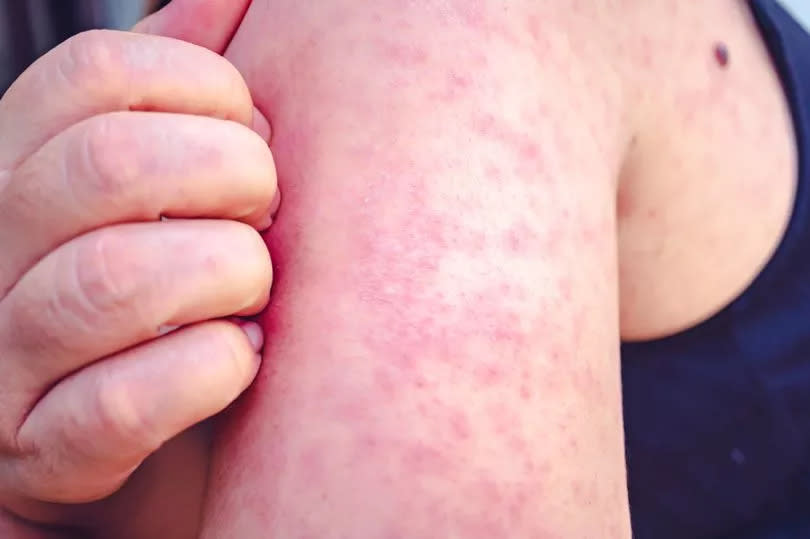Measles warning for parents heading to 17 holiday hotspots as cases soar across Europe

Parents planning summer holidays are being urgently advised to ensure their children are vaccinated, as Measles cases have surged in recent months, affecting 17 popular European holiday destinations. The latest data from the European Centre for Disease Prevention (ECDP) reveals that 1,671 cases of the potentially fatal disease were reported in April alone, with Romania, Poland and Belgium among the worst-hit areas, reporting 957, 84 and 76 cases respectively.
However, these three countries are not the only ones experiencing a rise in the illness. France, Austria, The Netherlands, Ireland, Spain and Portugal have all seen an increase in cases, causing public health concerns for both locals and tourists.
Additionally, a smaller number of cases have been identified in Sweden, Lithuania, Cyprus, Denmark, Greece, Croatia, Hungary and even Estonia.
Get the latest news straight to your phone by joining us on WhatsApp
These figures follow a staggering 10,887 cases of measles reported across Europe in the last 12 months, resulting in seven unfortunate deaths from the infection. However, the majority of infections (87%) were found in individuals who had not been vaccinated.
Health experts are now encouraging parents to vaccinate their children with the MMR vaccine to reduce the risk of infection and potentially severe complications if they contract the disease. Earlier this month, the UK Health Security Agency (UKHSA) called on parents to remain alert as cases in the UK also saw a significant increase at the beginning of the year, reports the Mirror.
So far this year, nearly 900 cases of the virus have been reported in 2024, compared to 368 cases recorded in 2023. This means that England has seen more instances of the disease in the first four months of this year than in the entirety of last year.
"Most of the cases have been in London, although there have been cases picked up across the country and some are linked to travel abroad," the UKHSA stated.
Alarmingly, vaccination rates for the deadly disease are at a 12-year low, with only 84% of children having received both MMR vaccines (a combined jab for Measles, Mumps and Rubella) before the age of five. To prevent outbreaks and protect vulnerable individuals who may be unable to receive the jab, this figure needs to exceed 90%.
Dr Helen Bedford, Professor of Children's Health at UCL, warned that current vaccine uptake figures are too low to keep the virus under control, and cases will only increase if they remain stagnant. She said: "This is the biggest outbreak of measles we've had since 2012. We've had more cases in the first four months of this year than in the whole of last year."
"The main reason for that is vaccine uptake figures for all vaccines, not just MMR figures have been going down very slightly year-on-year for the last ten years. Our uptake for the MMR vaccines overall for England is 89.3% for the first dose, and 84.5% for the second dose."
"But the big, important thing about measles is that it is incredibly infectious. It is the most infectious respiratory disease around, and because of that, we need to have very very high levels of vaccine uptake. We need at least 95% for both doses."
What are the symptoms of measles?
Measles commences with cold-like symptoms, such as a high temperature, runny or blocked nose, sneezing, cough and sore watery eyes, then a rash appears days later.
Some individuals may also develop small spots in their mouth. These minute white spots might appear inside the cheeks and on the back of the lips some days later.
These spots usually persist for a few days.

The rash generally appears a few days subsequent to the cold-like symptoms and commences on the face and behind the ears before spreading to the rest of the body. The measles rash spots are sometimes raised and meld together to form blotchy patches.
They're not typically itchy.
The rash appears brown or red on white skin. It might be harder to notice on brown and black skin.
How is it treated?
If you suspect that you or your child may have contracted Measles, it's crucial to stay away from nursery, school or work for at least four days from when the rash first appears. It's also advisable to avoid close contact with infants and anyone who is pregnant or has a weakened immune system.
The symptoms can be quite uncomfortable, so resting and drinking plenty of fluids like water to prevent dehydration can help, as well as taking paracetamol or ibuprofen to lower a high temperature.
Typically, the illness will start to improve on its own within about a week. However, in some cases, it can lead to serious complications such as pneumonia, meningitis, blindness, and seizures.
In pregnant women, it can potentially result in miscarriage or stillbirth, premature birth, or your baby being born with a low birthweight.
How can I prevent it?
The most effective way to prevent measles is by getting the MMR vaccine, a combined vaccine that provides protection against measles, mumps, and rubella. The MMR vaccine is offered to all children in the UK in two doses, which can provide lifelong protection against all three diseases.
However, some people are unable to receive the vaccine, such as pregnant women, those with a weakened immune system, or if you've ever had a severe allergy to any ingredients in the jab, neomycin or gelatine.

 Yahoo News
Yahoo News 
